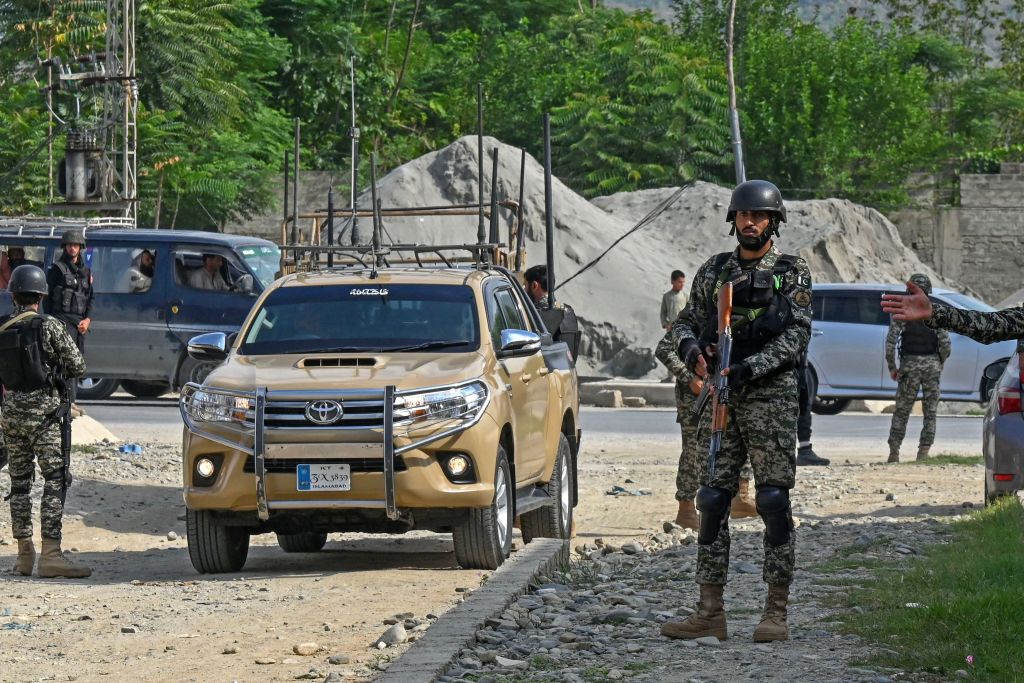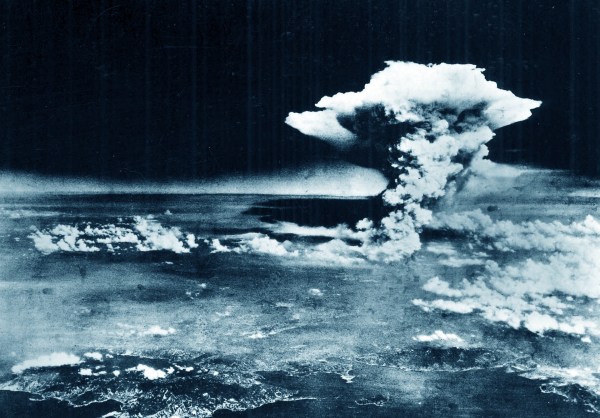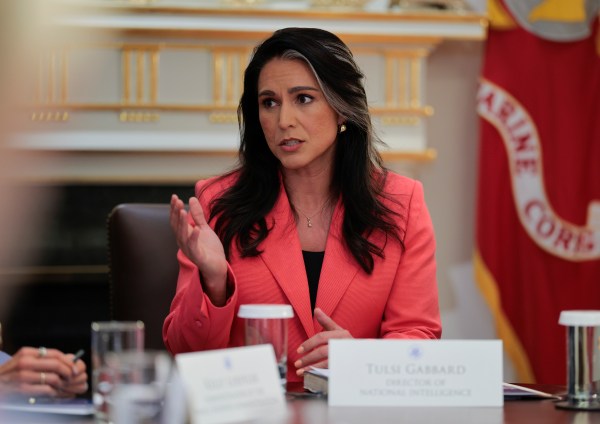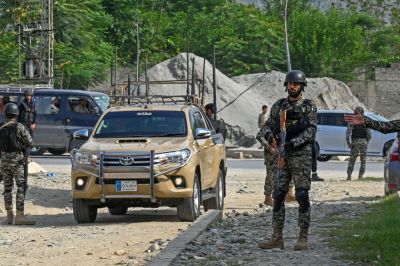The suicide bombing that killed more than 60 people and injured hundreds more Sunday at a political rally in Pakistan’s northwest Bajaur district is the latest spillover from chaos wrought by the Taliban’s takeover of neighboring Afghanistan. The suicide bombing was Pakistan’s 18th in this year alone, and the jihadist groups battling for control in the region show no signs of stopping.
Responsibility for the latest bombing was claimed by the Islamic State Khorasan (ISIS-K), a terrorist group fighting for pockets of control in Taliban-ruled Afghanistan and active across Central and South Asia. In tribal areas near the Afghan-Pakistani border, it’s hoping to pull supporters and influence from the dominant Islamist militia, the Tehrik-i-Taliban (TTP)—the Taliban’s Pakistani offshoot.
It’s a crisis of Pakistan’s own making. Even as it claimed to be a regional ally of the United States, Islamabad supported the Taliban in its multi-decade insurgency against U.S. forces and the now-deposed Afghan government. When Taliban fighters flooded into Kabul two years ago, then-Pakistani Prime Minister Imran Khan declared that they were “breaking the chains of slavery.”
But their relations quickly took a turn for the worse. Border skirmishes erupted throughout 2021 and 2022, but the biggest sticking point may be the Taliban’s backing of the TTP in its own insurgency against the Pakistani government. The Taliban’s triumph allowed the group—which had fled into Afghanistan after Pakistani crackdowns—to get its hands on advanced weapons, broaden its support base, and move some fighters back to Pakistan.
The TTP’s attacks have increased in frequency and intensity since it called off a ceasefire with Pakistan in November. A TTP splinter, for example, took credit for a bombing at a Peshawar mosque that killed more than 100 people in January—Pakistan’s deadliest month since July 2018. The militants regularly target groups and individuals affiliated with the Pakistani security forces, all the while aided by their Afghan allies.
“The Pakistani Taliban are getting the pre-9/11 al-Qaeda treatment by the Taliban,” Asfandyar Mir, a senior expert in the South Asia program at the United States Institute of Peace, tells The Dispatch. “It has haven across the border in Afghanistan, and it is prolific in its violence in the geographic scope.”
But even the Taliban’s fight against a mutual enemy—the Islamic State—has caused problems for the Pakistani state. As the Taliban disrupts ISIS-K’s operations on Afghan soil, many of its ousted operatives have set their sights on Taliban allies in Pakistan, including the political party targeted last weekend.
The bombing ripped through a campaign event held by Pakistan’s Jamiat Ulema-e-Islam (JUI-F), an Islamist party in Prime Minister Shehbaz Sharif’s coalition government and a longtime ally of the Afghan Taliban. The fundamentalist party enjoys a strong support base in Pakistan’s tribal areas and has worked with the Taliban to target Islamic State fighters across the border in Afghanistan: In 2021 it helped assassinate an Islamic State senior commander. In 2022 ISIS-K issued a series of fatwas—religious decrees—against the party, and killings have steadily increased ever since.
Sunday marked the first large-scale bombing claimed by ISIS-K in the region. The terrorist branch, which was formed in 2015 by TTP defectors, likely hopes the high casualty attack will help it win influence and recruits.
“Violence has a lot of attraction for people who are in this ecosystem. And so ISIS might be trying to signal to the rank-and-file of the TTP that, ‘we can do these spectacular attacks against these evil influences, so join us,’” Mir says. “That competition is certainly contributing to the escalation in ISIS’s violence that we’re seeing in Pakistan.”
Analysts fear this cycle may also drive the Pakistani Taliban to stage high-profile attacks ahead of the country’s general election, which is expected to take place in October or November of this year. The group has targeted political events in the past with an eye toward suppressing rally participation and thereby influencing the vote’s outcome.
It all threatens to undermine Pakistan’s already-fraught path to civilian rule. The nuclear-armed country has a long history of military interventions in politics—no prime minister has ever completed a full-five year term under the 1973 constitution—and continuing political violence could give the sitting government a pretext to delay the elections. Already this year Pakistan has seen riots over the arrest of Khan, the recently ousted prime minister, which brought the country to the brink of civil war.
Sabotaging the democratic system is one of the Islamic State’s stated goals. In a 92-page letter taking responsibility for the attack, ISIS-K excoriated its victims for supporting elections, which it considers a violation of Sharia law, and cautioned other religious parties against participating in the vote.
ISIS-K is now “highly motivated to exploit the volatile and tense situation in Pakistan to showcase the state as weak and incapable,” Amira Jadoon, an assistant professor at Clemson University and co-author of The Islamic State in Afghanistan and Pakistan: Strategic Alliances and Rivalries, says in an interview. “If such targeted attacks persist, it could have long-term consequences for public perceptions regarding security and civilian engagement in electoral processes, ultimately undermining the legitimacy and credibility of key state actors and institutions.”
The Pakistani government, for its part, has blamed Afghanistan for the proliferating terrorist threat. “We will act under international law to defend ourselves,” Pakistani Foreign Minister Bilawal Bhutto Zardari said this week, threatening to intervene in the Taliban’s counterterrorism efforts if attacks continue. “If the Afghan authorities don’t act, then action inside can be one of the options but not the first option.”
But Islamabad’s support for some terrorist groups and not others is at the heart of its current crisis, analysts say. Its inconsistent approach to Afghanistan is the clearest example.
“Pakistan has always tried to work with some terrorist groups while fighting others, and they have still not learned the lesson that, at the operational level, many of these groups cooperate and work with one another,” Husain Haqqani, a former Pakistani ambassador currently a scholar at Washington, D.C.’s Hudson Institute and the Anwar Gargash Diplomatic Academy in Abu Dhabi, tells The Dispatch. “The big picture remains that Pakistan continues to be dogged by Islamist terrorism, and still has no clear plan of how it’s going to deal with all the groups that in the past have either been accepted, supported, or tolerated by various governments.”







Please note that we at The Dispatch hold ourselves, our work, and our commenters to a higher standard than other places on the internet. We welcome comments that foster genuine debate or discussion—including comments critical of us or our work—but responses that include ad hominem attacks on fellow Dispatch members or are intended to stoke fear and anger may be moderated.
With your membership, you only have the ability to comment on The Morning Dispatch articles. Consider upgrading to join the conversation everywhere.